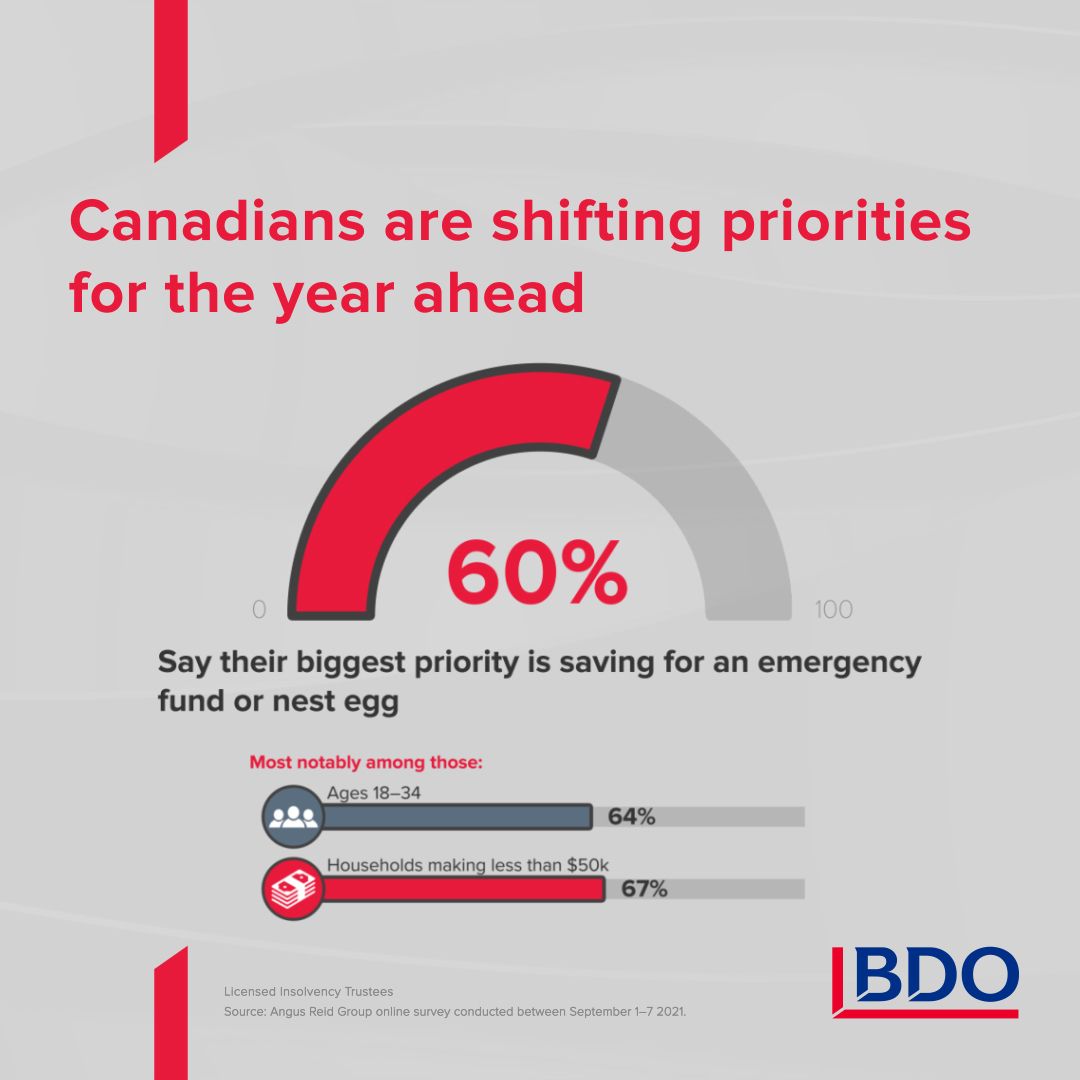TORONTO, October 18, 2021—The fourth-annual BDO Affordability Index from BDO Debt Solutions, which examines how affordable life is in Canada, shows that the COVID-19 pandemic is eroding the standard of living for many Canadians, while the rising cost of living has only added to their burden. To make matters worse, many don’t know how they are going to improve their situation.
Among the key findings of the survey, 43% of Canadians who carry debt added to their debt due to the pandemic, up four per cent compared to last year. One-quarter (26%) of Canadians incurred at least one new type of debt during the pandemic. Seven-in-10 (70%) say this new debt has made their standard of living worse, and only half (51%) of this group feel confident that they will be able to restore their standard of living to pre-pandemic levels.
Spending on essentials, job loss and reduced income are also taking a larger toll on Canadians’ savings this year, as compared to last year. Of the 42% of Canadians saving less or not at all during the pandemic, more than half (57%) said it was due to an increase in spending on essentials such as groceries and housing, an increase of 13% from last year. Half (51%) said it was because of reduced income or job loss.
The fourth-annual survey of over 2,000 Canadians was conducted in early September by the Angus Reid Group in partnership with BDO Debt Solutions. It continues to paint a picture of two different Canadas, with the financial situation of the ‘have-nots’ (primarily women, those ages 35–54 and Atlantic Canadians) becoming even more grave, while the ‘haves’ (primarily Canadians making $100,000 or more, British Columbians and those with a university education) getting even further ahead.
“This year’s BDO Affordability Index underscores the affordability challenges faced by Canadian families more than a year into the pandemic — and it’s clear many are feeling the combined pressure of rising costs of living and the ongoing impact of COVID-19. From increased debt loads to fewer opportunities to build their short- and long-term savings, many are not seeing a light at the end of the tunnel, which is cause for concern.”
Nancy Snedden, National Leader of BDO Debt Solutions
The proportion of indebted Canadians with increasing debt loads has remained steady year-over-year at 11%. Of the Canadians whose debt is increasing, 70% say the main reason is the rising cost of living. Overspending was not a major factor; in fact, overspending as a reason for increasing debt was down 15%, as compared to last year.
“Rising costs of living are definitely contributing to many people’s debt challenges,” says Snedden. “And because people are often hesitant to seek debt help, many people are simply unaware of the range of solutions that are available to them. Speaking to the right debt professional can make a big difference in their lives.”
Of the one-quarter (26%) of Canadians who have incurred new types of debt for the first time during the pandemic, credit card debt is the most common. One-in-10 (12%) of Canadians say they are now carrying credit cards with a balance for the first time.
To manage debt incurred due to the pandemic, two-thirds (64%) of Canadians reduced their non-essential spending, including entertainment and vacations, 47% reworked their budgets and 30% sold off their possessions. More than a year into the pandemic, more Canadians also looked to reduce their debt load by applying for government benefits (24%), starting a new job (18%) and getting a second job or side gig (17%).
When it comes to saving, the story of two different Canadas continues, with four-in-ten (42%) saving less or not at all, while three-in-10 are saving more. Those more likely to indicate they are saving less or not at all since the beginning of the pandemic include women (45%), Canadians ages 35 to 54 (48%) and Atlantic Canadians (50%). Of those Canadians who managed to save more (28%), the leading reason was a decrease in spending on non-essentials, such as restaurants, travel and electronics, with three-quarters (74%) of this group citing this reason for their increased savings.
Canadians are having trouble saving for retirement, as 60% of Canadians are not on track to retire, based on their current retirement savings. The data gets more worrisome when looking at Canadians ages 55 and over—though three-quarters (78%) of Canadians in this age group say they have retirement savings, three-in-10 (30%) say they are ‘very far behind’ in saving for retirement.
Canadians are increasingly facing affordability barriers when it comes to owning a home, with 45% of Canadians saying housing costs are a challenge—an increase of seven per cent year-over-year. The high cost of housing is forcing Canadians to put off their dream of homeownership, with three-quarters (74%) of Canadians ages 35–54 who don’t own a home saying they are unlikely to buy in the next three years. Half (48%) of the Canadians of all age groups who say they’re unlikely to own a home in the next three years indicate it’s because they are unable to save enough for a down payment.
Canadians are also experiencing more difficulties affording necessities, compared to earlier in the pandemic. Close to one-quarter (23%) of Canadians find it challenging to put food on the table for themselves and their families, up four per cent from last year. Three in 10 (31%) indicate paying for utilities is a challenge (up three per cent) and 35% say the same about transportation and clothing costs.

During the pandemic, those who relied on government benefits did so heavily. Three-in-ten Canadians (29%) accessed government benefits and more than three-quarters (76%) of these Canadians describe the benefits as ‘very important’ or ‘essential’. Of that group, women (82%), Canadians ages 35–54 (84%) and Canadians making less than $50,000 (80%) were more likely to have a pronounced need for government benefits to maintain their standard of living.
Although only four per cent of Canadians continue to receive government benefits, they are deeply dependent on them, as two-thirds (65%) of these Canadians are not confident that they can maintain their current standard of living once they stop receiving them.

In 2022, Canadians say their top priorities will be saving for emergencies, retirement and a major purchase, such as a home, car or cottage. Once again, the situation is different for the ‘haves’ compared to the ‘have-nots’, with the latter placing a higher priority on saving for emergencies, while the former will be focusing more on saving for retirement.
According to the data, 60% of Canadians say their priority is saving for an emergency fund or nest egg. This is a bigger priority for Canadians ages 18–34 (64%) and those making less than $50,000 (67%). Saving for retirement is a focus for 51% of Canadians, particularly among Canadians 35–54 (59%) and Canadians making more than $100,000 (62%). Spending on travelling (40%), non-essentials such as dining out and entertainment (31%) and paying down debt incurred by the pandemic (37%) will also be top priorities for some Canadians next year.
“With restrictions easing across the country, the temptation for Canadians to increase spending on non-essentials may be high. But as we look ahead, we continue to stress the importance of paying down debt and adhering to household budgets to help avoid adding new debt,” adds Snedden. “We encourage anyone who may need help overcoming their debt challenges to speak with a Licensed Insolvency Trustee, who will look at their whole financial picture, explain a full range of debt relief options—from budgeting strategies and debt consolidation to consumer proposal and bankruptcy—and help them get their finances on track to start fresh.”
BDO Debt Solutions has over 160 locations across Canada and over 60 Licensed Insolvency Trustees (LITs). BDO’s LITs and debt professionals are committed to helping Canadians take control of their financial future and turn the page on debt. LITs are the only professionals that are licensed by the federal government to file consumer proposals or bankruptcies on behalf of individuals.
In partnership with BDO Debt Solutions, Angus Reid Group conducted an online survey from September 1–7, 2021, among a representative randomized sample of 2,015 Canadian adults who are members of the Angus Reid Forum. For comparison purposes only, a probability sample of this size would yield a margin of error of +/- 2.2%, 19 times of out 20. Discrepancies in or between totals are due to rounding. Complete results of the 2021 BDO Affordability Index are available through the contact below.